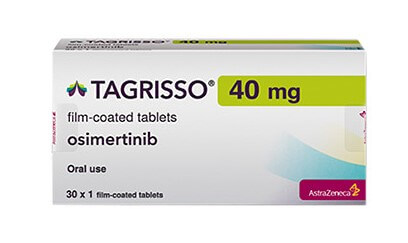Tagrisso (generic name: osimertinib) is used to treat locally advanced or metastatic non-small-cell lung cancer (NSCLC) if the cancer cells are positive for certain types of mutations in the gene coding for epidermal growth factor receptors (EGFR) or for activating EGFR mutations.
Osimertinib is a targeted therapy designed to interfere with the specific molecules that are part of the cancer’s growth and survival mechanisms. In the case of NSCLC with mutated EGFR, Tagrisso specifically inhibits the activity of the mutated EGFR. The drug can also be classified as an EGFR inhibitor or tyrosine kinase inhibitor (TKI).
Dosage
The typical recommended dose of osimertinib is 80 mg once daily, administered orally. The prescribing physician may change this according to several factors, including the patient’s response to the medication, the presence of side effects, and other health conditions the patient may have.
The drug comes in tablet form. The tablet should be swallowed whole with water and can be taken with or without food.
The duration of treatment can vary depending on several factors. In many cases, treatment is continued until disease progression or unacceptable toxicity occurs. There is also evidence that the body starts to build resistance to the drug within ten months, in which case the dosage may need to be adjusted.
Price comparison
The average retail price of Tagrisso is around $650 per tablet. With coupons, it is possible to buy it for around $550. The price from IsraelPharm is just $250 per tablet, delivered to your door.
Please read and follow the information on the manufacturer’s product insert leaflet with the medication. Failure to do so can cause serious health risks. Not all possible side effects can be listed here. If you experience any of these or other unexpected side effects, consult a healthcare provider immediately.
The common adverse effects include diarrhea, stomatitis, rashes, dry or itchy skin, infections around finger or toenails causing discoloration or growth issues, and changes in the blood, including low platelet counts, low leukocyte counts, and low neutrophil counts.
There is an increased risk that a patient can develop interstitial lung disease, which is a severe lung condition that can be fatal in some cases. Symptoms include difficulty breathing, cough, and fever. Regular monitoring and checks by a physician are necessary since early diagnosis and treatment are crucial.
If any of these or any other unusual effects are noticed, it is important to consult with the prescribing doctor immediately.
The drug is not recommended for use during pregnancy or breastfeeding due to potential risks to the fetus or infant.
Non-small-cell lung cancer (NSCLC) is the most common form of lung cancer, accounting for about 85% of all cases.
In some cases, the gene that codes for the epidermal growth factor receptors (EGFR) undergoes a mutation, leading to an abnormal form of the receptor. This abnormal EGFR is always turned “on,” causing the cell to divide and grow uncontrollably. The mutation converts EGFR from a regular cellular component into a trigger for the development of non-small-cell lung cancer (NSCLC).
Osimertinib is a third-generation EGFR inhibitor and is often used for cases where earlier treatments have failed or where specific, resistant mutations have developed.
Not every NSCLC patient will have the EGFR mutation, and even among those who do, not everyone will respond to EGFR inhibitors. Resistance to these drugs can develop over time.
Treating the specific genetic mutations in NSCLC, such as EGFR mutations, is critical for a tailored, effective treatment strategy. Targeted therapy offers a specialized approach that could significantly improve the prognosis.













